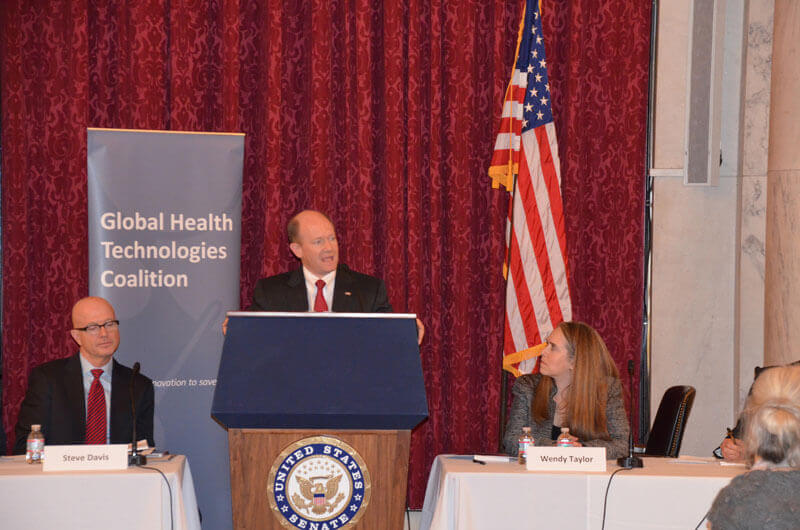Nick TaylorGHTC
Nick Taylor is a senior program assistant at GHTC, where he supports GHTS communications and member engagement activities.
“I deeply believe in the importance, power, and influence of research,” said Senator Chris Coons (D-DE) at GHTC’s congressional briefing. He added, “We all need to ensure that basic science eventually translates into saving lives.” The briefing—GHTC’s fifth annual where we launched our 2014 policy report—brought together leading voices from the nonprofit, philanthropic, public, and private sectors to reinforce the importance of robust support for global health research and development (R&D). For generations, the US government has invested in the lifesaving potential of research and innovation, supporting discoveries that have improved public health around the world. These investments have led to breakthroughs in global health and contributed to the development of remarkable vaccines, drugs, diagnostics, devices, insecticides, and other health technologies.

Moderator Steve Davis, president and CEO of PATH, opened the briefing by reminding attendees what’s really at stake if the US government does not continue to be a leader in global health R&D: “The United States now stands at a critical juncture. Although the recent budget agreement prevents a second round of sequestration cuts, stabilizing global health R&D will require Congress to preserve funding for global health R&D, and US agencies must protect global health research and programming within their own budgets.” He added, “Halting funding would mean that the world may never benefit from the tools that are so close to development and delivery.”
Many US government agencies play a vital role in global health research and product development, including the Centers for Disease Control and Prevention, the Department of Defense, the Food and Drug Administration, the National Institutes of Health, and the US Agency for International Development (USAID). Specifically, USAID has announced several promising developments in global health innovation over the past year. In addition to releasing a report to Congress on its activities in global health R&D, the agency continues to support the critical work of the Center for Accelerating Innovation and Impact at USAID. Panelist Wendy Taylor, director of the Center for Accelerating Innovation and Impact, mentioned at the briefing that USAID is currently involved in about 100 of the technologies currently in the global health pipeline. “Science, technology, and innovation are driving progress in global health,” said Taylor. She added, “Innovation bends the curve of history and makes the impossible, possible.”
Critical to the work of the Center for Accelerating Innovation and Impact, as well as global health R&D broadly, are public-private partnerships. The private sector plays an important role in providing expertise and know-how to develop new technologies. Adrian Thomas—vice president of Global Market Access, Commercial Strategy, and Global Public Health at Janssen Pharmaceuticals, Inc.—reinforced the importance of multi-sector engagement: “We have to have the right partnerships and programs…the right incentives in play” to develop tools for low-resource settings. Thomas explained to the audience that incentives are key to getting private-sector engagement. “Without co-financing from donors like the US government, the risk to develop some products would be too high,” Thomas explained at the briefing. Many of the public-private partnerships involved in global health product development are also funded in part by the Bill & Melinda Gates Foundation. While the importance of the Gates Foundation is unquestionable, they fully admit that they cannot be the only funder involved in the development of new technologies for low- and middle-income countries. “The US government is the world’s largest and most important funder in global health R&D,” said Dan Hartman, director of Integrated Development at the Gates Foundation. Hartman continued to explain that without steady funding from the US government, we risk losing the progress we’ve made in research over the last decade.
Each of the panelists during this year’s briefing gave very compelling arguments to Congress and the Administration why we need continued and increased support for global health R&D. Yet none were more compelling than Winfred Amoako, a tuberculosis (TB) survivor originally from Ghana. Shortly after moving to the United States in 2010, Amoako was diagnosed with TB. When asked what he would say to US policymakers if given the chance, he said: “I would say…please continue the fight. Continue to be the leader in research so that someday we can eliminate TB and these diseases.” That important message reminds us about the lives that are affected by neglected diseases and global health challenges. As Steve Davis said in his concluding remarks, “We are at the brink of a remarkable time in global health…we can and we must do more.” The stakes have never been higher, which is why the US government must continue its leadership role in supporting global health research and innovation so that essential technologies reach all of the patients who need them.